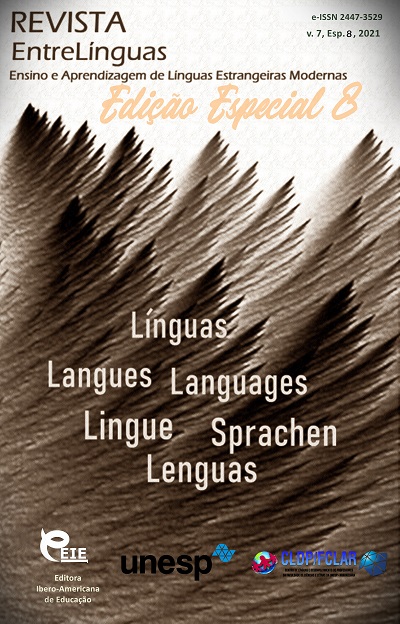La fenomenología del tiempo en la filosofía poética de A.I. Vvedensky
DOI:
https://doi.org/10.29051/el.v7iesp.8.16351Palabras clave:
Tiempo, Momento, Insustancialidad, Conciencia, Coherencia-incoherenciaResumen
Para la ontología no clásica, uno de los principales problemas es el tiempo. Es a través del pensamiento sobre el tiempo y su relación con la esencia del hombre, el pensamiento o el ser que Kierkegaard, Bergson y Heidegger intentaron construir una ontología diferente. El tema del tiempo fue también uno de los temas principales del poeta y filósofo ruso A. I. Vvedensky. Los autores del artículo sugieren que sobre la base de sus poemas y reflexiones unidos convencionalmente bajo el título "El cuaderno gris" se pueden formular los principios de una fenomenología especial del tiempo; este trabajo plantea el tiempo como un fenómeno cuasi-ontológico que actúa cuando percibimos y ordenamos la realidad a través de él, pero desaparece cuando intentamos observarlo y captarlo. El tiempo no puede ser una secuencia o una medida de conteo. Pensar en el tiempo es una experiencia específica en la que no solo desaparece el tiempo mismo, sino también la realidad habitual medida y ordenada por él, y se abre algo más: un mundo fuera de secuencia y relación, fuera de relaciones y visiones estables y limitadas. En este nuevo mundo, el meditador mismo se disuelve y desaparece cruzando la frontera entre el tiempo y la eternidad, lo inmanente y lo trascendente, lo humano y lo divino. Así, la fenomenología del tiempo de Vvedensky no es un estudio teórico sino un giro práctico, un cambio en la forma de existencia y, en última instancia, una experiencia de salvación y libertad.
Descargas
Citas
"...a company of friends abandoned to fate". L. Lipavsky, A. Vvedensky, Y. Druskin, D. Kharms, N. Oleynikov: "The Chinars" in texts, documents and research: in 2 vol. V.2 – Мoscow: "Ladomir" publ., 2000. – 749 p.
DRUSKIN, Y.S. (1999). Diaries. – St.Petersburg: "Academichesky proyekt", – 605 p.
Edmund Husserl. (1990). On the Phenomenology of the Consciousness of Internal Time (1893–1917) / trans. by Brough, J.B.: Dordrecht: Kluwer.
GIBIAN, G. (1971). Introduction: Daniil Kharms and Alexander Vvedensky. Russia's Lost Literature of the Absurd: A Literary Discovery: Selected Works of Daniil Kharms and Alexander Vvedensky. — Ithaca & London: Cornell University Press.
KERSTEN, F. (1982). Edmund Husserl. Ideas Pertaining to a Pure Phenomenology and to a Phenomenological Philosophy – First Book: General Introduction to a Pure Phenomenology. The Hague: Nijhoff.
LIPAVSKY, L., VVEDENSKY, A., DRUSKIN, Y., KHARMS, D., & OLEYNIKOV, N. (2000). A company of friends abandoned to fate. The Chinars" in texts, documents and research: in 2 vol. V.1 – Мoscow: "Ladomir" publ., – 846 p.
MILLNER-GULLAND, R. (1991). Beyond the Turning-Point: An Afterword. Daniil Kharms and the Poetics of the Absurd. — London.
STONE NAKHIMOVSKY, A. (1982). Laughter in the Void: An Introduction to the Writings of Daniil Kharms and Alexander Vvedenskij. Wiener Slawistischer Almanach. Sonderband 5. — Wien.
VVEDENSKY, A.I. (1993). Complete works in 2 vol.: V.1. Works of 1926-1937 - Мoscow: "Gilea" publ., – 285 p.
VVEDENSKY, A.I. (1993). Complete works in 2 vol.: V.2. Works of 1938-1941 - Мoscow: "Gilea" publ., – 271 p.
Descargas
Publicado
Cómo citar
Número
Sección
Licencia

Esta obra está bajo una licencia internacional Creative Commons Atribución-NoComercial-CompartirIgual 4.0.
Os manuscritos aceitos e publicados são de propriedade da Revista EntreLínguas. Os artigos publicados e as referências citadas na Revista EntreLínguas são de inteira responsabilidade de seus autores.
Transferência de direitos autorais – autorização para publicação
Caso o artigo submetido seja aprovado para publicação, já fica acordado que o(s) autor(es) autoriza(m) a UNESP a reproduzi-lo e publicá-lo na EntreLínguas, entendendo-se os termos “reprodução” e “publicação” conforme definição respectivamente dos incisos VI e I do artigo 5° da Lei 9610/98. O artigo poderá ser acessado pela rede mundial de computadores (Internet), sendo permitidas, a título gratuito, a consulta e a reprodução de exemplar do artigo para uso próprio de quem a consulta, desde que haja a citação ao texto consultado. Essa autorização de publicação 328 EntreLínguas, Araraquara, v. 1, n .2, p. 323-328, jul./dez. 2015 não tem limitação de tempo, ficando a UNESP responsável pela manutenção da identificação do(s) autor(es) do artigo. Os artigos publicados e as referências citadas na Revista EntreLínguas são de inteira responsabilidade de seus autores.











